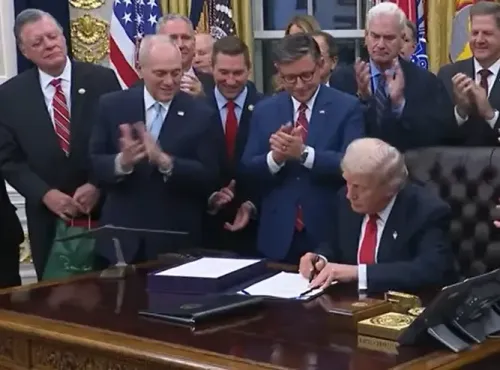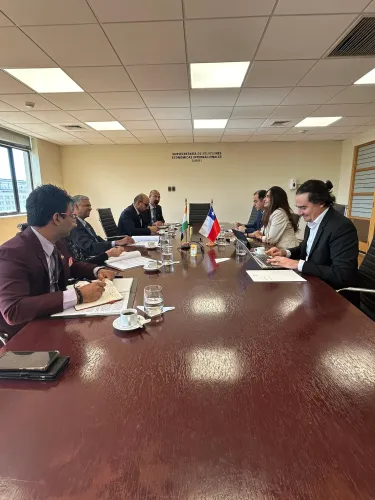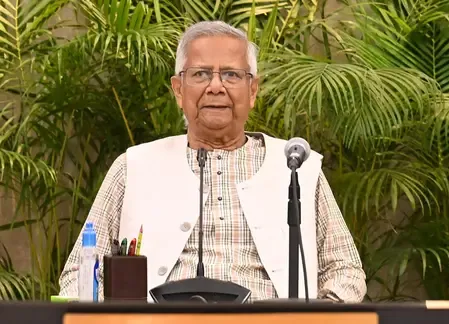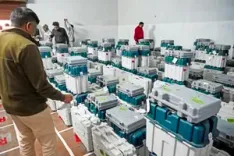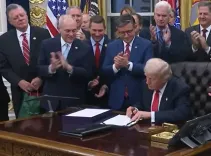How is US Prez Trump Tightening H-1B Visa Regulations?
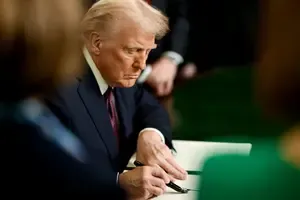
Synopsis
Key Takeaways
- New $100,000 annual fee for H-1B visa applications.
- Shift in hiring practices to prioritize American workers.
- Limited visa renewals to a total of six years.
- Increased scrutiny from the Department of Justice on hiring practices.
- Gold card program introduced for high-value visa applicants.
Washington, Sep 20 (NationPress) - In a significant blow to Indian tech professionals operating in the United States and major tech firms, U.S. President Donald Trump has enacted a proclamation aimed at drastically reducing the H-1B visa program. Under this new directive, a fee of $100,000 will be imposed annually for each application, intending to limit the misuse of the visa system and promote the employment of local workers.
During the proclamation signing on Friday at the White House, Trump stated that the “motive is to prioritize American workers.”
“We require skilled workers. We need exceptional talent, and this essentially guarantees that,” Trump emphasized.
Commerce Secretary Howard Lutnick supported the initiative, asserting that this policy aims to dissuade corporations from hiring overseas talent.
“The core idea is that large tech firms will no longer train foreign workers. They will need to pay the government $100,000 and then compensate the employee. It’s simply not economically viable. Train a recent graduate from one of our esteemed universities instead. The goal is to cease bringing in individuals to take our jobs. That’s the essence of this policy: $100,000 annually for H-1B visas,” he detailed.
Lutnick also noted that the visa can only be renewed for a cumulative six-year term and applies to both new and renewal applications.
“Either the individual is highly valuable to the company and the nation, or they will leave. We must end the practice of allowing individuals to enter the country on these visas, which were previously granted without charge,” he remarked.
The proclamation indicated that the H-1B visa program has been “systematically exploited to displace, rather than complement, American workers with lower-paid, lower-skilled labor,” thus endangering both “our economic and national security.”
As per the order, the Secretary of Labor will initiate rulemaking to adjust prevailing wage levels as well.
Both Trump and Lutnick affirmed that all major tech firms are “supportive of this initiative.”
“They appreciate it. They genuinely favor it. They require it. I believe they will be very pleased. Everyone will benefit, and we will retain individuals in our country who are poised to contribute significantly,” Trump remarked.
Additionally, President Trump signed an executive order establishing a 'gold card' program allowing individuals to obtain a visa for $1 million and corporations for $2 million.
The H-1B visa program, limited to 85,000 new visas each year, permitted U.S. companies to recruit skilled foreign labor in fields such as technology and engineering. This recent decision is expected to have wide-reaching effects on prominent American tech firms.
Data from Pew Research indicates that workers from India received approximately 73% of the total approved H-1B visas in 2023, with China following at 12%, largely due to extensive backlogs in approvals and a significant influx of skilled immigrants from India.
In August, the Department of Homeland Security proposed modifications to the existing system by eliminating the lottery system in favor of a “weighted selection process.”
The U.S. Department of Justice (DoJ) has also intensified its scrutiny of hiring practices under the H-1B visa program, urging workers and employers to report cases where U.S. citizens might be unfairly bypassed in favor of foreign visa holders. This initiative is spearheaded by Harmeet Dhillon, the India-born Assistant Attorney General of Civil Rights at the DoJ.
Dhillon revealed in August that the department has initiated “numerous” investigations and taken action against “some” employers already. “We encourage Americans to reach out on our hotline with tips,” she urged.
In December 2024, following the elections, Trump expressed his support for H-1B visas, declaring that he is a “believer” in the program and has personally utilized it in the past.
“I possess many H-1B visas for my properties. I support H-1B. I have employed it multiple times. It’s an excellent program,” he stated.
Trump’s comments came in the wake of opposition to H-1B visas from far-right activists. Tesla CEO and former Trump aide Elon Musk also pledged to fight vigorously to defend the H-1B visa program.

